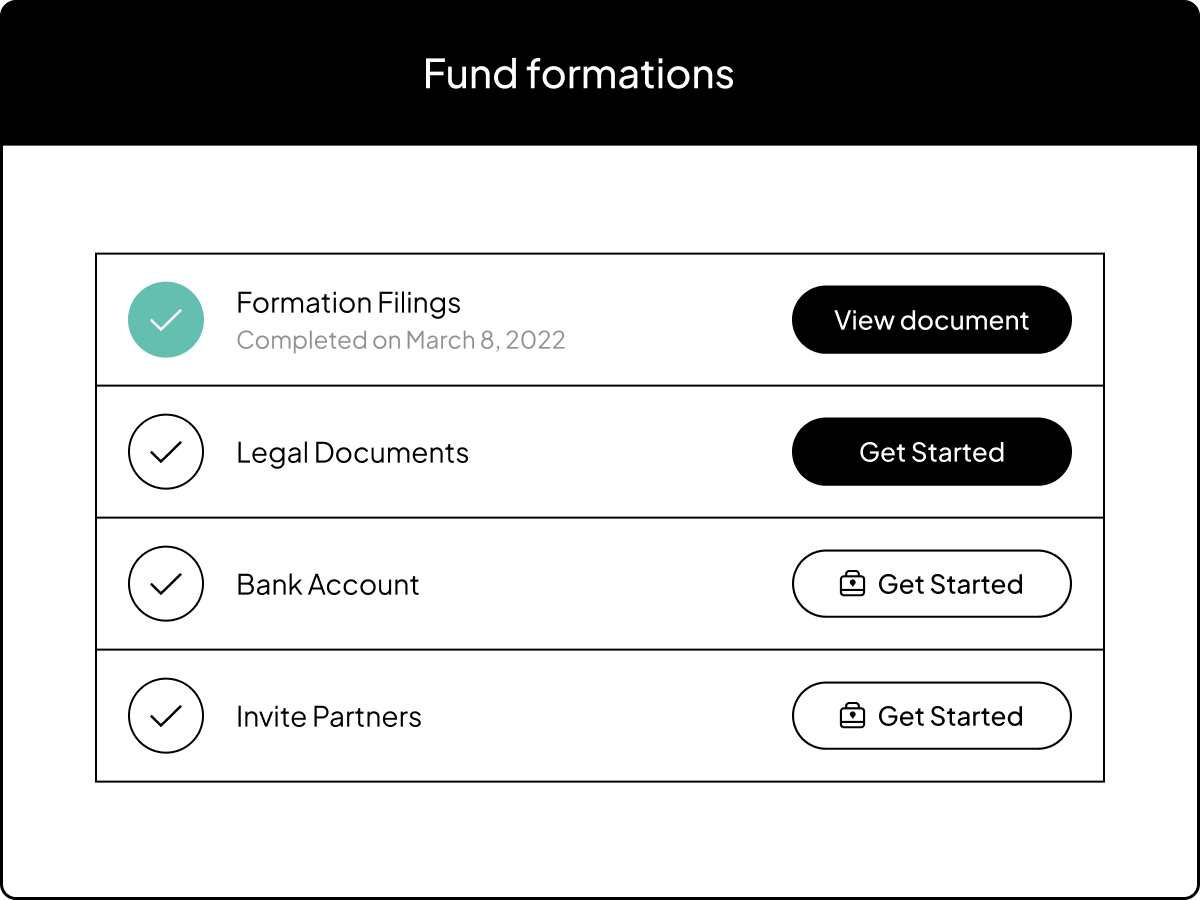The value of strong relationships
Starting a venture capital firm means joining a highly collaborative niche industry where long-term relationships are key to success. According to the 2021 NVCA Pitchbook Yearbook, there are fewer than 2,000 venture capital firms in the United States and roughly 10,000 active individual venture capital investors. In such a small space, getting ahead depends on making genuine connections.
The bonds you forge with the entrepreneurs you invest in are critical, but the most important relationships to cultivate are with your fellow GPs. Traditional fund models typically have a 10-year duration, which means you’ll be in a relationship with your partners for a decade or more.
To set yourself up for success and navigate the inevitable challenges that come your way, it’s helpful to vet your prospective partner or partners. You’ll want to be on the same page when it comes to your work style and investment philosophies.
As you’re debating which GPs to partner with, consider the following questions:
- Do you and your prospective partners have a track record of working and investing well together?
- Do you share a commitment to the purpose of your work?
- Do you each bring diverse perspectives to the table? Aligning on general principles is key, but so is having multiple viewpoints.
Structuring the management company and the general partnership
Every venture capital fund structure has two crucial components: the management company and the general partnership entity. The management company operates the funds and receives the management fee. It also hires the team, licenses the brand for the fund to use, and controls the fund’s fixed costs.
The GP entity controls the investments and chooses the deals. You have to create a new GP entity for each fund your venture capital firm manages. GP entities are typically structured as limited liability companies (LLCs), which provide some tax advantages and personal liability protection for the partners.
Solo general partnerships
If you don’t want to include other investors in your general partnership, you can explore the idea of a solo act. As long as you can manage your fund size on your own and get LPs on board, becoming a solo GP has some significant advantages. You have complete control over your investments, and you can also streamline the decision-making process and move more quickly on your own. Being a solo capitalist also makes it easier to account for deal attribution and build a track record, since you’re the only source.
If you go the solo route, though, you may face capacity challenges. When you’re working on your own, you won’t necessarily have the bandwidth to scale or take on new projects. Here are some questions to help you decide:
- How much experience do you have investing? How diverse is your network? Your network will be a critical source of deal flow and capital.
- Do you prefer collaborating with others or working on your own?
- Is your single viewpoint enough to help you make an informed decision, or do you need more perspectives?
- What is your end goal with the fund? Do you want to build something that can last without your input, or are you comfortable with your investments being dependent on your involvement?
- Do you want full control over your fund’s operation and decision-making or are you comfortable sharing responsibilities and control with others? Do you have the skill set to do each necessary task efficiently and well?
The investment team
Your investment team is responsible for sourcing, investing, and managing your fund’s portfolio. Depending on your capacity and goals, your investment team could be two talented GPs or two dozen people—including GPs, principals, associates, and analysts.
Regardless of the size or shape of your investment team, it’s critical to create a diverse and inclusive group. Greater diversity and inclusion leads to more thoughtful decision-making, increased innovation, and greater financial success. A 2019 McKinsey study found that companies with more racial and ethnic diversity outperformed their peers by 36% in profitability, while companies with greater gender diversity on their executive teams were 25% more likely to have above-average profitability.
As venture capital firm Valor Ventures has made clear, inclusion is one of the few controllable risks you can apply to your teams and portfolio companies that lead to a positive outcome. Valor Ventures’ Inclusion Premium is the idea that prioritizing racial, ethnic, and gender diversity in your firm can help you outperform competitors and make a more meaningful impact on the world.
The operations team
Your operations team is made up of everyone who’s not on the investment team. That includes your platform team, administrative support staff, accounting experts, finance gurus, and legal team. You won’t necessarily have a full operations team when you’re just starting out, but it’s important to prioritize a couple of key positions.
The first is an experienced accounting consultant with a venture capital background. Working with someone who’s well versed in the venture space saves you time, money, and headaches. You’ll have less work on your plate as a GP, and you can rest easy knowing that your venture-savvy accountant isn’t making costly mistakes.
The second is a fund administrator. When you’re building relationships with LPs and juggling meetings and conversations, it helps to stay organized. That’s where a fund admin comes in. Whether they’re virtual, a contractor, or a full-time person on payroll, a fund admin can help arrange your schedule of investments, perform distributions, and generate reports.
At Carta, our Fund Admin team handles funds of all sizes, taking over the tedious back-office work so you can focus on managing your fund.
Building your network
Building your firm is just one part of creating a successful organization—you also have to expand your network by participating in the venture capital community. One of the best ways to get started is by joining venture capital groups and organizations. Here are just a few to consider:
- The National Venture Capital Association (NVCA), the industry’s preeminent trade group, advocates for public policies and industry initiatives that benefit the startup and venture ecosystems.
- Kauffman Fellows hosts industry events, summits, and venture capital fellowships. You can apply to their two-year fellowship program or become a member of the Kauffman Fellows Network by sponsoring someone for a fellowship.
- Venture Forward, a nonprofit supporting organization of NVCA, uses education and research to advance diversity, equity, and inclusion within the venture space.
- Confluence.VC is a community and resource library for venture and growth equity investors to collaborate with, learn from, and support one another.
- Transact Global a diverse community of emerging fund managers in the world.
Venture partners, operating partners, and scout models
Even if you’ve already assembled your teams, you may want to consider rounding out your firm with a venture partner, operating partner, or scout program. A venture partner helps to source deals and manage investments, but isn’t a full-time or permanent member of the partnership. Working with a venture partner is a good way to add insight and experience to your team without committing to another GP.
An operating partner, on the other hand, is someone dedicated to improving your firm in a specific area, like marketing, talent recruitment, leadership, or digital transformation. Hiring an operating partner is akin to hiring an on-demand C-suite executive or expert. The operating partner’s job is to come in as a consultant and provide support and strategies that strengthen your operation.
Another way to bolster your firm is to develop a scout program. Scouts are people who invest small amounts of money (usually around $50,000 at the seed stage) in startups on your fund’s behalf. Scouts can be angel investors, executives, or even founders. If you want to expand your network and support companies at the seed stage while saving capital for Series A and B rounds, scout programs are a good solution.
DISCLOSURES: This communication is on behalf of eShares Inc., d/b/a Carta, Inc. (“Carta”). This communication is not to be construed as legal, financial, accounting or tax advice and is for informational purposes only. This communication is not intended as a recommendation, offer or solicitation for the purchase or sale of any security. Carta does not assume any liability for reliance on the information provided herein.
This communication contains links to articles or other information that may be contained on third-party websites. The inclusion of any hyperlink is not and does not imply any endorsement, approval, investigation, or verification by Carta, and Carta does not endorse or accept responsibility for the content, or the use, of such third-party websites. Carta assumes no liability for any inaccuracies, errors or omissions in or from any data or other information provided on such third-party websites.
All product names, logos, and brands are property of their respective owners in the U.S. and other countries, and are used for identification purposes only. Use of these names, logos, and brands does not imply affiliation or endorsement.

